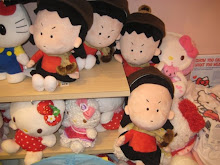Amerasia Journal: Call for Abstracts
"Transoceanic Flows:
Pacific Islander Interventions across the American Empire"
Publication Date: Spring 2011
Consulting Guest Editor: Keith L. Camacho, Assistant Professor of Pacific Islander Studies, UCLA Asian American Studies Department. He is the author of Cultures of Commemoration: The Politics of War, Memory and History in the Mariana Islands (Forthcoming, University of Hawai'i Press) and, with Setsu Shigematsu, co-editor of Militarized Currents: Toward a Decolonized Future in Asia and the Pacific (Forthcoming, University of Minnesota Press). Camacho is also a new member of Amerasia Journal's editorial board.
Amerasia Journal Editor: Adjunct Professor Russell C. Leong, English and Asian American Studies, Project Director of U.S./China Media Brief (www.uschinamediabrief.com). Amerasia Journal, published by the UCLA Asian American Studies Center, has been the core scholarly journal in the field for 40 years (www.aasc.ucla.edu/aascpress).
Review and Publication Deadlines:
Due date for 2-page abstracts: September 1, 2009
Due date for final papers: June 1, 2010
Publication date of issue: Spring 2011
Send copies of abstracts to: Keith L. Camacho kcamacho@ucla.edu and Russell C. Leong rleong@ucla.edu. Inquiries and abstracts will be reviewed by the editors, and the authors will be notified.
Amerasia Journal invites contributions for a special issue on "Transoceanic Flows: Pacific Islander Interventions across the American Empire." As the majority scholarship reveals, studies about Pacific Islanders and the American Empire often invoke anthropological and area studies notions of culture and identity, theory and history. Hawai'i receives the most attention among these studies, advancing Kanaka Maoli articulations of sovereignty on the one hand and normalizing Hawai'i as the locus of overseas American Empire on the other. For reasons having to do with the perceived boundaries of the "American Pacific," interdisciplinary debates about the "native," and imperial erasures of indigenous memory and history, few scholars have ventured beyond Hawai'i and taken stock of Pacific Islanders engagements with American Empire in Micronesia and in the continental United States. This issue calls attention to these Pacific Islander interventions and to the ways in which they inform and are informed by the politics of ethnic studies, gender studies, indigenous studies, race studies and sexuality studies.
What is at stake, then, in Pacific Islander interventions across the interdisciplinary paradigms of "Asian American Studies," "Native American Studies" and "Pacific Islander American Studies?" How do Pacific Islander epistemologies and methodologies reckon with the qualifiers "American," "Asian," "Native" and "Pacific" in contemporary academic, community and policy discourses? What kinds of intellectual projects and political coalitions might be realized, furthered or diminished by these interdisciplinary trajectories, and why?
The editors seek to feature indigenous and international scholars who examine Pacific Islander classes, cultures, genders, identities, races and sexualities across American Samoa, the Commonwealth of the Northern Mariana Islands, Guam, the Federated States of Micronesia, Hawai'i, the Republic of the Marshall Islands and the Republic of Palau. Essays on Pacific Islander settler and mixed-race communities in California, Oregon, Utah and Washington are also welcome, as are commentaries, interviews, original artwork, photography, and poetry.
"Transoceanic Flows: Pacific Islander Interventions across the American Empire" thus solicits 2-page abstracts which address the following questions:
(1) How do Chamorros, Chuukese, Fijians, Kanaka Maoli, Kosraeans, Maori, Marshallese, Palauans, Pohnpeians, Samoans, Tongans and Yapese, among other Pacific Islanders, construe "class," "gender," "indigeneity," "race," and "sexuality" across the United States, and why? In what ways do these "keywords" advance or restrict indigenous vernaculars of self and other, collectivity and nationality, or spirituality and religion?
(2) What kinds of migrant, indigenous, nationalist and sovereignty, redress, and
land-and-water-rights movements are taking place in America's Pacific territories and in
the broader diaspora? How do the transoceanic flows of capital, ideas, labor, law,
militarism, religion and sports sustain, link, challenge or transform these social
movements? Similarly, how do these movements imbricate with civil-rights and
indigenous-rights discourses? And how do Asian Americans, Native Americans and Pacific Islanders--adopt or reject--the transoceanic configuration of these movements?
(3) How has 9/11 reshaped the ways in which Pacific Islanders engage in American federal, immigration and militarist policies across the Pacific Islands and across settler communities in the United States? How have these American policies redefined American "borders" and American "belonging" across Oceania? Further, how do Pacific Islanders racialize otherness in the wake of 9/11 and in the onslaught of America's War in Iraq, especially in light of increasing Pacific Islander military participation in the War?
The editors also welcome other questions and topics which are not addressed in this call for abstracts. Please direct all inquiries to the editors.
Subscribe to:
Post Comments (Atom)




No comments:
Post a Comment